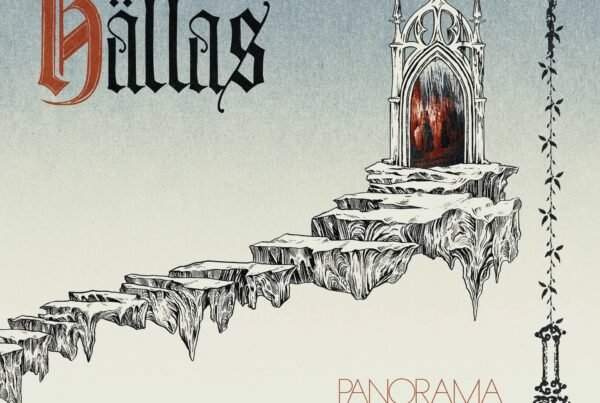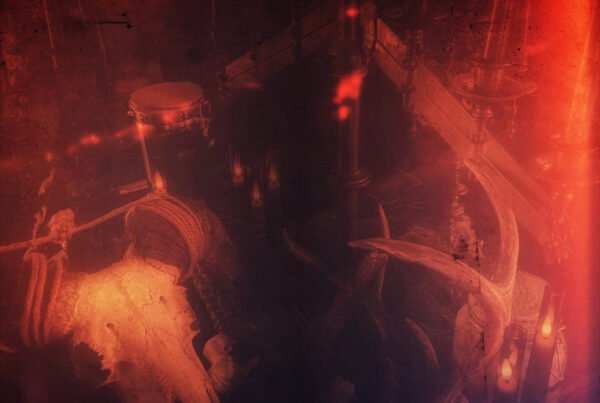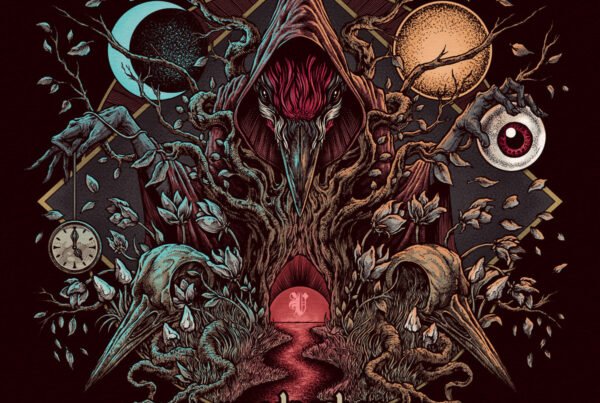Llynks’ debut album, Become the Root, is both a rebirth of Sara Kendall and a triumphant arrival of her powerful new direction.
Release date: July 10, 2020 | Independent | Instagram | Facebook | Twitter | Bandcamp
Wielding elements from industrial, dark-pop, and 80s movie soundtrack synth-pop, Become the Root is a tour-de-force of style and aesthetic. I left my first full-length listen inspired, and with a crystal-clear image of this avatar Kendall has embodied through the personality of these tracks. Through the natural strength of her vocal talents, a playful relationship between consonant and dissonant melodic ideas, and off-beat, otherworldly cinematic production, Llynks has created a spectacular dark wonderland, and it’s a thrill to explore.
Whilst this is Kendall’s first full-length release, she has been releasing tracks under the name Sara Kendall for some time now, including a 2018 EP Comply. Her talent was evident on these tracks, however in comparison to Llynks, there’s a certain restraint to it, as if we are only seeing a sliver of the parts that make up her whole. The cinematic flair and dense production were present, but it felt like she was playing it safe. With Become the Root, however, there is a sense that all the influences and ideations that were under the surface, have been gathered up and let loose. With her debut album, Llynks intends to ‘tackle the concept of taking one’s own perception in an emboldened tone’, and she has done this and more, displaying a fascinating and dominating persona.
The album opener “Rise-Fall” serves as a good transition from the strengths of Comply, with the chorus having all the melodrama and movie soundtrack qualities of that EP. The industrial and dark influences are introduced too, easing us into the more experimental tracks to come. The chorus reminded me of Florence and the Machine. The soaring background vocals and lush harmony are immense with presence. The next verse also introduces old-school video game synth arpeggiation, adding depth and variety to a song already heavy on production. Throughout this album, there’s many of these moments of variety and it helps pace an otherwise intense listen.
Speaking of variety, “Aching for Me” is a fascinating mishmash of genres. The verses offer a driving synth-pop rhythm, with all the hope and nostalgia of an 80s movie, school’s out, summer montage, before arriving at a domineering dark-pop chorus. Llynks shows her musical strengths here in making these starkly different feeling parts work together and transition cleanly. It’s a skill essential to avant-pop artists, and the same skill that makes pop outliers such as Grimes and SOPHIE so intriguing and charismatic.
The album has a great sense of pacing altogether, breaking up the big dramatic movie trailer tracks, with deeper dives into the industrial and dark-pop influences. “Doesn’t Matter Anyway”, trailing the grand and triumphant chorus of “Purified”, uses a deep house beat and cheesy distorted vocals that sound straight from a Daft Punk or Fatboy Slim refrain. Heavily distorted guitars bring in a straight industrial chorus, with all the grime and grit of genre leaders Nine Inch Nails. The clarity of Llynks‘ character weaves all these elements together seamlessly. Throughout the whole listen I had this vivid mental image of a hellish succubus, almost like a video game boss. Whether intentional or incidental through embodying her personality to its fullest extent, Llynks assumes an avatar dripping with allure and power; playful and deceptive, but supernaturally dangerous.
It came as a surprise to me then, that my highlight of the album sees Llynks drop this persona altogether in the hauntingly beautiful piano ballad “Patterns Through Seams”. Opening with a rhythmically creative vocal line over singular organ tone chords, the track is sparse and uses reverb and echo to enhance Kendall’s already ethereal voice. Reminiscent of Imogen Heap’s “Hide and Seek”, the strength of the melody and vocal performance alone seems to silence everything around it. A song like this has the unique ability to stop everything in place for just a few minutes, capturing and owning an instance in time, enrapturing the listener’s pounding heart and cresting breath.
As synths crescendo in the chorus, the tension is broken by a simple lone and wistful riff. Llynks cries out through the chorus, ‘I’m tired of this god-damn routine/I’m worried about what life should be’, before dropping the intensity altogether. It gives the sensation of letting go and making peace with the anxieties and tensions of the things in life that never quite turn out how we had hoped. There’s a certain release and acceptance, that while life can bring disappointment and hurt, there’s a strength and beauty in looking past what could be and knowing that what remains can live symbiotically with these emotions. The imperfections and shortfalls don’t have to be regrets, there’s still magic in the patterns through seams.
“Like You Said You Would” returns to the 80s synth arpeggiated feel, using the major key to close off the album in a conclusive and resolute, yet nostalgic fashion. We leave a mad and wild wonderland to an almost comically non-plussed conclusion. It reminds me of how as the end credits roll at the end of a film, we have grown to understand a character whom we must now say goodbye to; we must now find our own way. Nothing is different externally when you leave the movie theatre, but internally, you feel completely changed. It’s also worth noting that this song is about another, where most of the album has been focussed on the distinct self of Llynks. There’s a lesson here: empowering ourselves, includes allowing others to empower themselves and seek their own path. In the lyrics to this song, she is clearly not shutting out the pain and regret of the past, but invitingly sings, ‘I know you’ll find your balance/You’ll be who you want to be.‘ It’s a fascinating decision to end the album like this, and personally I find immense power in this empowering of the lives of others, despite any hurt they have caused us.
Llynks’ debut album Become the Root is both a tying up of all her endeavours and experiences as Sara Kendall, and a new beginning in adopting an supernatural image. Through exploring dark timbres and dissonance, and contrasting them with the hope-filled, wistful gaze of 80s synthwave and movie aesthetics, Llynks has created a moving and unique standout work. Through understanding all the steps that brought her to this point, and becoming what lies at the root, she creates a map to understanding the self and self-expression.






